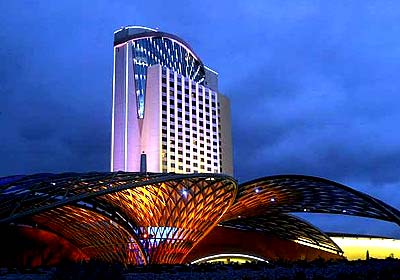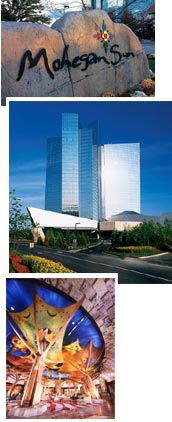 Another Stereotype of the Month entry:
Another Stereotype of the Month entry:
 Another Stereotype of the Month entry:
Another Stereotype of the Month entry:
Challenging the Indian gaming monopoly
Doug Bandow
March 9, 2005
WASHINGTON -- Gambling is big business. It also is illegal in most states -- except for government-run lotteries and American Indian casinos.
Gambling, like most human activities, can be abused. But that's no reason to ban it. A free society allows people to make what everyone else believes to be a mistake.
Yet 23 of 30 states that prohibit gambling allow casinos by Indian tribes, which are treated as sovereign nations. This peculiar "sovereignty" has spawned an $18.5 billion business encompassing 411 Indian facilities.
The largest casino complex in the world is in Connecticut, not Las Vegas -- the 4.7 million square foot Foxwoods Casino and Resort. Five tribal operations currently are seeking to build in New York's Catskill Mountains. The Cheyenne-Arapaho are pushing to construct a 500 acre facility near Denver International Airport.
There are 54 Indian establishments in California, which collect some $5 billion. California reporter Jan Golab argues that "Gov. Arnold Schwarzenegger's legacy will largely be a matter of whether or not he allows the Golden State to become the new Nevada." With 107 federally recognized reservations and rancherias, there is almost a limitless prospect for expanding tribal gaming in California.
One of the most pernicious aspects of the preferential treatment accorded Indian gambling is turning Indian Tribes into a well-funded special interest seeking political favors. Some $150 million in political contributions have given Indian tribes substantial clout.
Although the largesse can backfire -- stoking popular anger against former California Gov. Gray Davis, for instance -- the tribes retain numerous friends at the state and federal levels. The Indian monopolies wouldn't be quite so outrageous if limited to real tribes with real reservations. But the prospect of abundant booty has led to numerous abuses.
Golab points to the 70-member Miwok Indian tribe, whose membership was opened by Bureau of Indian Affairs officials -- who themselves joined the Miwoks -- before pursuing a $100 million California casino. Moreover, profit-seeking groups constantly attempt to surmount whatever government rules currently limit Indian gaming.
For instance, property acquired after 1988 is ineligible to host a gaming enterprise, absent special circumstances. However, Americans Indians often press for exceptions.
For instance, in San Pablo, Calif., the Lytton Band of Pomos wanted turn a card room into a massive slot operation. U.S. Rep. George Miller, D-Calif., helped out by authoring legislation to effectively backdate their land purchase.
U.S. Sen. Diane Feinstein, D-Calif., is pushing to reverse that legislative sleight of hand.
Moreover, substantial local opposition has stalled state legislative approval of the pact signed by Schwarzenegger with the Pomos.
The issue is not whether the San Pablo casino is a good or bad deal. Supporters and opponents seem equally ardent.
The real problem is that the process is politicized, with American Indians possessing a unique privilege to run gaming operations. Best would be to open gaming to anyone, allowing anyone to indulge in what many consider to be a bad habit, with due regard to the consequences on other.
At the very least, Congress shouldn't manipulate the rules for the interests of particular Indians and their outside partners. Creating "instant tribes" and establishing "instant reservations" is no way to run the gaming business.
Congress needs to go far beyond individual cases like San Pablo and reconsider the 1988 Indian Gaming Regulatory Act, which has unintentionally spawned the explosion of American Indian casinos.
In fact, Washington should more fundamentally reconsider the status of American Indians.
There's much to regret in America's treatment of the continent's original inhabitants.
But that's still not a good reason to create artificial enclaves with special privileges not possessed by the rest of the population. Such as opening casinos when no one else has that right.
Indeed, the best thing for American Indians would be to escape their protected, regulated status. Admittedly, casinos have been a boon for many tribes. Observes Dee Pigsley, chairwoman of the Confederated Tribes of Siletz, "No other development could return the kind of profits that a casino could offer."
But Indians should participate in a variety of entrepreneurial enterprises rather than be dependent on public subsidies through the Bureau of Indian Affairs and artificial gaming monopolies through Congress. America's Indians once were oppressed and mistreated. Today, however, many of them have become sophisticated business operators and political players.
Indeed, their success is why, notes Jan Golab, "Despite Arnold Schwarzenegger's success in standing up to the Indian tribes of California, most elected officials are afraid to address the issue of sovereignty." Schwarzenegger notwithstanding, tribal casinos continue to expand.
Many lawmakers perceive the political risks of challenging the industry to be great while the electoral benefits to be few.
However, public frustration with today's preferential system for American Indian gambling is growing. The issue is too important for lawmakers to avoid for long.
Doug Bandow is a senior fellow at the Cato Institute.
©2005 Copley News Service

Rob's reply
When right-wing commentators talk about "special privileges," Indians should guard their wallets.
>> It also is illegal in most states -- except for government-run lotteries and American Indian casinos. <<
And racetracks, card clubs, bingo halls, and charitable "Las Vegas" nights. Actually, something like 47 states have legalized some form of gambling.
Indian tribes can pursue casinos in most states only because those states have legalized gambling. The Cabazon decision says states may prohibit gambling, but if they allow it, tribes can do it too.
>> Yet 23 of 30 states that prohibit gambling allow casinos by Indian tribes, which are treated as sovereign nations. This peculiar "sovereignty" has spawned an $18.5 billion business encompassing 411 Indian facilities. <<
Treated as sovereign because they are sovereign. "Peculiar" only if you don't understand US history.
>> California reporter Jan Golab argues that "Gov. Arnold Schwarzenegger's legacy will largely be a matter of whether or not he allows the Golden State to become the new Nevada." <<
Golab wrote one of the most biased articles against Indian gaming ever. See Golab: "Sovereignty Is a Concept...That No Longer Works" for details.
>> One of the most pernicious aspects of the preferential treatment accorded Indian gambling is turning Indian Tribes into a well-funded special interest seeking political favors. <<
Note that Bandow doesn't say "preferential treatment accorded" by whom. This treatment has been accorded by 200 years of consistent judicial rulings on Indian sovereignty, acts of Congress culminating in the Indian Gaming Regulatory Act, and votes by the public authorizing Indian gaming on reservations. When the American voters and their government representatives decide something, it's called democracy, Doug.
>> Some $150 million in political contributions have given Indian tribes substantial clout. <<
Even if the number is true, this is a false or misleading statistic. Let's do some calculations. Assume 300 gaming tribes spending $150 million in the five years since Indian gaming exploded with the passage of California's Proposition 1A. That's $100,000 per tribe per year. When you divvy that up among candidates for president, Congress, governor, state legislator, and even mayor as well as all the ballot initiatives, you'll see each effort is getting only a few thousand dollars. Big deal.
Sure, candidates like Cruz Bustamante and initiatives like Proposition 70 occasionally may get millions. That means other candidates and initiatives average even less. The tribes' money and "clout" didn't help Bustamante or Proposition 70 win, so big deal again.
Tribes also gave to candidates such as John Kerry and Tom Daschle, who lost. Clearly Indians are only one political player among many and do not have the power to dictate the outcomes they want.
See Have Gaming Tribes Bought California for $120 Million? No for more on the subject.
>> The Indian monopolies wouldn't be quite so outrageous if limited to real tribes with real reservations. <<
How outrageous would they be? A recent analysis suggested that at most, only a dozen or two of the 400-plus Indian gaming facilities are questionable. In other words, even by the loosest of criteria, about 95% of all Indian casinos are run by "real tribes on real reservations." Such an outrage.
>> Golab points to the 70-member Miwok Indian tribe, whose membership was opened by Bureau of Indian Affairs officials -- who themselves joined the Miwoks -- before pursuing a $100 million California casino. <<
See Golab for more on that story.
>> Moreover, profit-seeking groups constantly attempt to surmount whatever government rules currently limit Indian gaming. <<
That criticism applies to capitalism in general. The supposed "glory" of the system is that when millions of people try to selfishly maximize their profits, it creates an "invisible hand" that allocates resources efficiently.
>> For instance, in San Pablo, Calif., the Lytton Band of Pomos wanted turn a card room into a massive slot operation. U.S. Rep. George Miller, D-Calif., helped out by authoring legislation to effectively backdate their land purchase. <<
And because of the built-in checks and balances, that attempt is on the ropes and probably will fail. So our political system handled it just like it's supposed to.
>> The real problem is that the process is politicized, with American Indians possessing a unique privilege to run gaming operations. <<
The charge that the process is politicized is silly. We're talking about tribal governments in conflict with state and local governments. How could that not be politicized?
Moreover, the process was politicized before Indians had gaming. Only then they lost every political battle because they didn't have any clout. Now they do.
As for the "unique privilege," it's more of a right than a privilege, since it stems from the Constitution. It's not unique or even rare, as noted at the beginning of this response.
And this "privilege" or right has been granted by the public. They can revoke it if they wish. In 2004 Californians had the chance to open gambling to card clubs with Proposition 67. They voted no, meaning they voted to retain the Indians' existing semi-monopoly.

"Instant tribes" and "instant reservations"
>> Creating "instant tribes" and establishing "instant reservations" is no way to run the gaming business. <<
Luckily, that isn't happening. For the most prominent example recently, see the analysis of the Schaghticoke decision at The Facts About Indian Gaming.
>> But that's still not a good reason to create artificial enclaves with special privileges not possessed by the rest of the population. <<
So Bandow is against the reservation system? He wants to end the reservations and give the Indians back their land, as numerous treaties require? Wow, that's a courageous position!
>> Such as opening casinos when no one else has that right. <<
Others do have that right. States such as Pennsylvania, Iowa, and Minnesota are negotiating to expand gaming even as I write. And again, Americans have given Indians the right to pursue gaming. Indians haven't taken this right through some illegal or underhanded means.
>> Indeed, the best thing for American Indians would be to escape their protected, regulated status. <<
Yeah, right. Those dumb Indians keep clinging to their reservations when they could move to cities and get jobs. For more on this subject, see The "Outdated" Reservation System.
Now we're getting to Bandow's real agenda. Terminate the tribes and let them assimilate into the mainstream. Take away their gaming revenue and redistribute it to everyone—meaning to large, established corporations owned mainly by white investors. Keep the poor poor and let the rich get richer. Classic conservative dogma.
This assertion that Indians' "protected, regulated status"—in other words, their sovereignty—has hurt them is flatly false. A recent study has proved what's inherently obvious: that having your own government, culture, and land is better than not having them.
Bandow isn't arguing to end the nation's division into states, with their "protected, regulated status." No one in this country would argue for that, because people don't want to give up their rights and privileges. Having a government to look out for your interests is why people form societies in the first place.
If Bandow thinks he can convince us we'd be better off without California, New York, and so forth, let him try. Until then, why would he single out tribal governments for elimination? Because he doesn't like "newcomers" sitting at the table, playing the game, and winning sometimes? Because his people were better off when the Indians were vanishing and the government was taking their land?
>> But Indians should participate in a variety of entrepreneurial enterprises rather than be dependent on public subsidies through the Bureau of Indian Affairs and artificial gaming monopolies through Congress. <<
Entrepreneurial enterprises are already happening throughout Indian Country. Many tribes think gaming is a short-term fix and plan to diversify their economies.
The federal and state governments are the ones who limit the tribes' independence. Tribes don't choose to be any more "dependent" than they have to be.
The so-called "subsidies" must mean the treaty benefits that the US government promised to pay. These are tradeoffs for the land the government took, not welfare handouts.
>> America's Indians once were oppressed and mistreated. <<
In many cases they still are. The Bush administration is cutting budgets for Indian services while pouring money into the pockets of the Iraqi government, Halliburton, oil and energy companies, HMOs and insurance companies, and wealthy Americans in general.
>> Indeed, their success is why, notes Jan Golab, "Despite Arnold Schwarzenegger's success in standing up to the Indian tribes of California, most elected officials are afraid to address the issue of sovereignty." <<
No, most officials support the idea of tribal sovereignty because it's historically valid and morally right as well as politically popular.
Bandow bought and paid for
Columnist Resigns His Post, Admitting Lobbyist Paid Him
Op-Eds for Sale
Related links
Indian rights = special rights
The facts about Indian gaming
|
. . . |

|
All material © copyright its original owners, except where noted.
Original text and pictures © copyright 2007 by Robert Schmidt.
Copyrighted material is posted under the Fair Use provision of the Copyright Act,
which allows copying for nonprofit educational uses including criticism and commentary.
Comments sent to the publisher become the property of Blue Corn Comics
and may be used in other postings without permission.